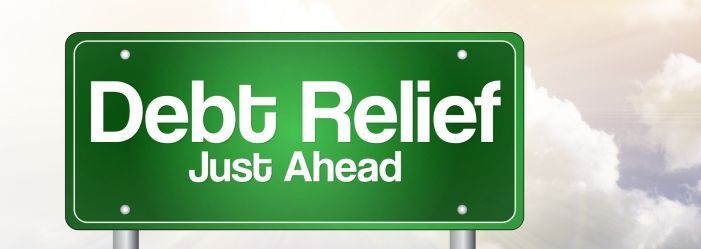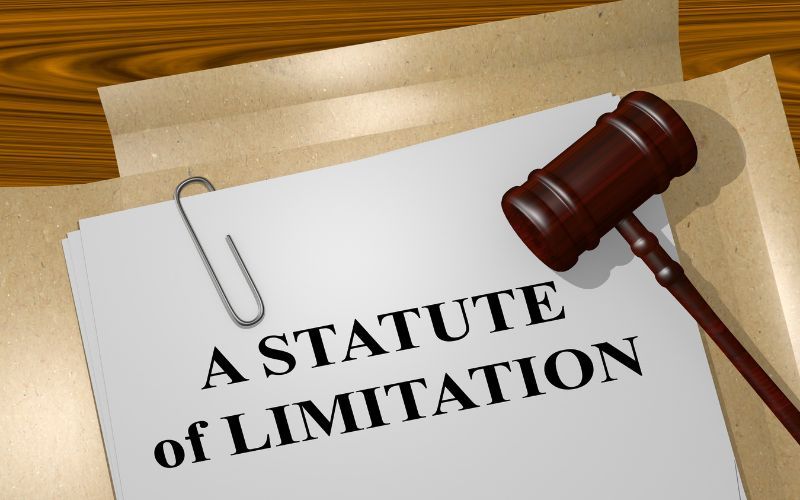Last Updated: March 22, 2024
Learn more about the statute of limitations

Disclaimer: We are not qualified legal or tax professionals and are not giving advice. Always speak with a qualified professional before making any legal or financial decisions.
Facing credit card debt can be overwhelming, especially as balances grow over time. However, did you know there's a legal time limit after which old debts can no longer be legally enforced?
This is known as the statute of limitations for credit card debt, and it varies by state. Understanding this can offer a pathway to managing or even resolving outstanding debts without the fear of legal repercussions.
In this guide, we'll explore what the statute of limitations entails, how it differs across states, and practical steps you can take if you're dealing with old credit card debt. Let's dive into your rights and options to navigate this complex landscape effectively.
Don't want to read through? Speak to a debt specialist right now.
What is a Statute of Limitations?
A statute is a written law that has been passed by a legislative body, either as federal law or state law.
A statute of limitations is the time limit placed on how many years that legal action can be taken. You may have heard that there is no statute of limitations on murder. This means you can be prosecuted whenever you are caught.
The statute of limitations for debt is based on each state's laws, type of debt, and the credit agreement you have with the creditor.
State Laws for Statute of Limitations
There are four types of debt that are covered by state statutes of limitations. These are oral contracts, written contracts, promissory notes, and open-ended accounts.
What to Do If Sued for Time-Barred Debt
If you are sued for a time-barred debt, it is essential to respond and appear in court, armed with evidence that proves the debt falls outside the statute of limitations. Bring along a copy of the statute of limitations for your state to present to the judge. You may also need to provide records like your last payment date. If the court determines the debt is time-barred, the case will most likely be dismissed.
Oral Contracts
These types of contracts are not put in writing. Technically, you can collect on a "handshake contract" in court, but they can be difficult to enforce. You can make a verbal agreement with the offer, acceptance of the offer, and fulfillment of the offer. It helps to have a witness to the agreement if the contract goes to court. These contracts are considered "Contracts Implied in Fact."
A creditor can not make a verbal agreement on real estate/property sales, transfers, or leases, paying off someone else's debt, marriage, or contracts that last more than a year. These are considered fraudulent agreements.
Verbal contracts often require legal assistance to settle.
Written Contracts
A written contract is one that is put in writing and signed by both parties. Most of us have signed contracts for credit cards, property, employment, and loans. It is far easier to collect on a written agreement.
Before you sign an agreement, READ and understand the fine print. This lays out all the details about payment, where the debt will be taken to court, mandatory arbitration, and fines and penalties. If the contract does not make sense, ask a lawyer or someone with more experience to read it for you.
Promissory Notes
A promissory note is a promise to repay a debt. A common form of this type of agreement is an IOU. A promissory note that says you owe a certain amount:
- that is payable on demand
- with a date that it must be repaid
- lays out any penalties
- lays out any interest on the loan
If you take out a promissory note, it should by typewritten and notarized, but as long as both parties sign it, it is a binding agreement.
Open-ended Accounts
These are also known as revolving accounts and include credit cards and home equity lines of credit. With an open-ended account, you have a credit limit and can use up to that limit as long as you repay all or part each month.
State Laws for Limitations
Every state has a different time period for debt statute of limitations but ranges between three and fifteen years. There are a lot of qualifying conditions that determine where your debt will go to court and how long your statute of limitations are. These include, but are not limited to:
- If you acquire debt in one state and move to another state with a borrowing statute, your statute of limitations may be based on the shorter of the two time periods.
- If you signed an agreement that if you default, your debt will go to court in a specified state, not the state where your debt was acquired.
Setting the Debt Clock

As long as you are making payments, the debt clock that sets that statute of limitations period is not running. If you stop making a monthly payment, the statute of limitations begins the debt clock the day your debt goes delinquent, not the date of the last payment.
30 Days Past Due
If you fail to make a payment within 30 days (even a late payment) after the due date, the failure is reported as delinquent to the credit bureaus, and this badly hurts your credit score. The lender may assess late fees and other penalties.
Contact the lender to see if you can set up a payment arrangement or have penalties removed.
60-90 Days Past Due
At 60 days past due, the creditor will send letters, call you, or attempt to get you to pay debts. They may consider taking you to court.
At 90 days, a 90-day-delinquency may be reported to the credit bureaus and will cause more harm to your credit history and credit reports.
90-120 Days Past Due
After 90 days, several events can be triggered. Depending on the company, you may be taken to court. It's crucial to know can a credit card company sue you for unsecured debt and the minimum amount a debt collection agency will sue you for.
Since we are discussing credit card debt, the credit card issuer will likely close your credit card, charge it off (declare it uncollectible) and sell it to a debt collector. At this point, you can no longer make agreements with the original creditor. Debt collectors may take you to court or may attempt to collect through phone calls and letters.
If you are being threatened with legal action, read our article The Difference Between a Summons and a Demand Letter. Additionally, it's essential to understand when a debt collector might sue and how to dispute collections and win.
Resetting the Debt Clock
There are several actions that will reset the debt clock back to zero. These include making a payment, partial payment, or promising to make a payment when contacted by a collection agency. If you plan to age out an unpaid debt, keep these in mind.
Specific Actions that Reset the Clock
While the statute of limitations clock starts when you become delinquent on payments, certain actions can reset the clock and give collectors more time to sue. This includes making a partial payment or even just acknowledging you owe the debt if contacted by collectors.
Collectors may try to get you to reset the clock on a time-barred debt if they believe it has not expired. Never agree to make even a small "good faith" payment on a time-barred debt, as this can revive the debt and remove your statute of limitations defense.
Zombie Debt
Occasionally, you may have debt that has been paid or has aged out show back up. It's also worth noting what happens to credit card debt after 7 years, known as time-barred debt.
This is because collection agencies sell old debts to each other and your zombie debt may show up. Contact the collections agency with proof and then keep that proof so the next time it shows up, you can immediately respond.
FAQs
Fair Debt Collection Practices: a Federal Law
The Federal Trade Commission has set limits on debt collectors. This federal law, the Fair Debt Collection Practices, prevents certain actions by collection agencies.
These actions are prohibited:
- Pretending to be a government official or an attorney
- Contacting you between 9 p.m. and 8 a.m. without your permission
- Threatening violence or using profanities when speaking to you (don’t be goaded into being rude to a collector. It can work against you if the phone calls are replayed in court)
- Sending letters that look like an attorney or governmental letters but that are not
- Contact third parties (family, friends, and employers) about your debt or otherwise embarrassing you – offer your creditors up-to-date information and the debt collection agency cannot contact third parties
- Speaking to your employer except under limited conditions - see above
- Sending derogatory messages about you to a credit reporting agency
- Sending information on a postcard – this can include social media
- Attempting to collect time-barred debt
- Hiring an unlicensed credit collection agency
- Communicating with you if you are represented by an attorney
For the actual federal law, check out this blog. If they are in violation, contact a consumer lawyer.
Many states have their own state law concerning fair collection practices, generally covering the original creditor. For each state's statute of limitations, either check our state pages, or google (your state) statute of limitations on debt.
Debt Relief
If you are seeking debt relief, Pacific Debt Relief can help you decide your best course of action on overdue debt or old debt. There are four different methods to get debt relief, including credit counseling, debt consolidation, debt settlement, and bankruptcy.
While we specialize in debt settlement, our certified debt negotiators will help you understand all your options and financial decisions and refer you to the best option for you.
Learn more about the different types of debt solutions available to you.
Credit Counseling
Credit counseling helps you learn about personal finance management including developing a budget, helping you understand your credit score, and set up a debt management program. This program is best for people just starting to get into debt.
Look for professional credit counselors from a non-profit credit counseling organization. A for-profit agency often receives compensation from your creditors when setting up a debt management plan.
Click here to learn more about Credit Counseling.
Debt Consolidation
Debt consolidation means rolling all debt into a low-interest rate debt consolidation loan or home equity loans, or works with a debt consolidation company to set up a consolidation plan.
If you have good credit and can get financial products with better terms than your existing debt, this may be a good option.
Click here to learn more about debt consolidation.
Debt Settlement
In debt settlement, a debt negotiator works with creditors to decrease the total amount owed. The debtor stops paying all enrolled debt and puts the monthly payments into a savings account. As the debt is negotiated, the creditors are paid out of the savings account.
Debt settlement focuses on unsecured debt like a personal loan and credit card balances.
There are some issues with debt settlement including credit score damage and income tax liability. The debt settlement also stays on a credit history for up to seven years.
Debt settlement is best for someone considering bankruptcy.
Contact Pacific Debt today for a free consultation.
Bankruptcy
Filing bankruptcy is a last resort option – this court-determined action wipes out most of your total debt, severely damages your credit for up to ten years, and is expensive and time-consuming.
Click here to learn more about bankruptcy.
As you see, you have a few options. Contact Pacific Debt today so we can help you with your financial goal and understand the limitations on debt relief.
Pacific Debt Relief: A Company You Can Trust

Since 2002, Pacific Debt Relief has settled over $300 million in debt for thousands of clients just like you. Pacific Debt Inc specializes in credit card debt relief, personal loan debt relief, collections debt, and other types of consumer-generated debt.
As a debt relief company, we focus on maximizing debt settlement results and living up to our reputation as the nation's most consumer-friendly debt relief company. You can see our level of commitment in our customer reviews.
If you have debt and would like to see your options, we invite you to discover how much you can save just by answering a few questions.
Join over thousands of debt-free customers and learn what Pacific Debt Relief's Debt Settlement Program can do for you!
Conclusion
Understanding the statute of limitations for credit card debt in your state is key to knowing your rights when dealing with collectors. Don’t panic if an old debt resurfaces.
Take time to verify it is valid and compare records of your last payment to your state's time limits before you agree to anything. If the debt is time-barred, you have legal defenses to avoid repayment or lawsuits.
Seek professional help if you are unsure how to respond to collection attempts. With the right information, you can take control of old debts and avoid harassment. We hope this overview has helped provide clarity on this complex topic. Please reach out with any other questions.
If you are struggling with overwhelming debt and want to explore your debt relief options, Pacific Debt Relief offers a free consultation to assess your financial situation. Our debt specialists can provide objective guidance relevant information and support to help find the right debt relief solution.
*Disclaimer: Pacific Debt Relief explicitly states that it is not a credit repair organization, and its program does not aim to improve individuals' credit scores. The information provided here is intended solely for educational purposes, aiding consumers in making informed decisions regarding credit and debt matters. The content herein does not constitute legal or financial advice. Pacific Debt Relief strongly advises individuals to seek the counsel of qualified professionals before undertaking any legal or financial actions.
✔ Accredited by Better Business Bureau with BBB A+ rating (4.93 rating and 1678 reviews)
✔ US News and World Reports and Bankrate ranked Pacific Debt Relief as one of “The Best Debt Relief Companies of 2024”
✔ 6.9 star rating by BestCompany.com (over 2379 client reviews)
✔ 4.8 star rating by TrustPilot based (over 1613 verified consumer reviews)
✔ ConsumerAffairs.com Accredited (over 544 verified reviews with an average rating of 5 stars)
✔ A Top 10 Rated Compan by TopTenReviews.com , ConsumersAdvocate.com and Top10debtconsolidation.com
✔ 4.6 star rating by Google (229 client reviews)
✔ 100% rating by SuperMoney (9 client reviews)
Reduce Your Credit Card Debt By Up to Half

BBB Reviews | 4.9/5.0 Rating









 Do Not Sell My Personal Information
Do Not Sell My Personal Information